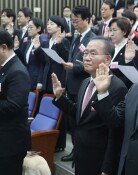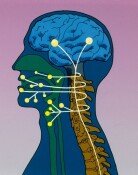Students Human Rights
A growing movement seeks legislation of an ordinance on students human rights led by left-leaning groups who generally support the Korean Teachers and Education Workers Union. The Seoul headquarters of a coalition for the proposed legislation will be launched Wednesday. The organization will have more than 30 civic groups participating, including the unions Seoul branch and a parents association for "genuine education." Groups backing the union are in an upbeat mood after the June 2 election of education superintendents whom they supported in six metropolitan cities and provinces, including Seoul and Gyeonggi Province, and members of metropolitan and provincial councils and education boards.
The ordinance the groups seek to enact will likely contain clauses from one that Gyeonggi education superintendent Kim Sang-gon sought to enact but was shelved in the face of opposition by the Gyeonggi Provincial Office of Education. The draft ordinance prepared by the office includes a more liberal student dress code and hairstyles, freedom to assemble, and the right to help set educational policy and to accept or reject education excluding official curricula.
The importance of students human rights is undeniable, but restricting certain rights in the scholastic year cannot necessarily be construed as being non-educational, just like minors do not have the right to vote. Disregarding the characteristics of students, who are in the process of learning, and leaving public students without regulations like adults could result in populist ideas of human rights.
For instance, many parents are opposed to liberalizing student dress codes and hairstyles. If students wear casual clothing instead of school uniforms, those from low-income families could feel deeper isolation and lack of privilege. Leftists argument that they mean to protect and help the underprivileged will likely worsen social polarization. Moreover, granting students the right to assemble, participate in school management, and accept or reject learning excluding official curricula seems linked to much more serious political and ideological issues.
In a proposal urging public participation in its Seoul headquarters, the coalition for the ordinance on students human rights recently said, Education ruled by authoritarianism and market principles was challenged and transformed because students emerged as a political force by exposing the reality at schools, adding, Students` human rights will serve as a stepping stone for them to leap forward to become the subject of education and citizens and the subject of politics. The proposal also contains the phrase, The masters of the 2008 candlelight vigils against resumption of U.S. beef imports were teenagers. These left-leaning groups should know better than trying to justify this way an incident wherein students came to participate in rallies after being incited through lies and groundless accusations. Rather, this incident should make the entire educational community reflect on itself.
The conventional educational community is liable for the consequences because of those who support the teachers` union and act as if they are the guardians of students human rights. Only when parents and teachers with sound ideology and understanding exercise competence, passion and morality can the country protect its beloved children.







